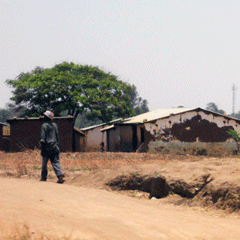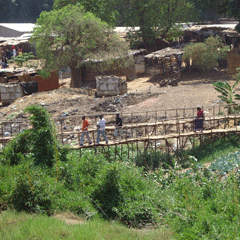[2 November 2012] -- Although only 20 percent of Malawi’s population currently lives in urban areas, that number is expected to reach 50 percent by 2050. To help it better manage this transition, the Government of Malawi is developing a National Urban Policy (NUP), with funding from the Cities Alliance and technical support from the United Nations Human Settlements Programme (UN-Habitat).
The effort is building on the outcomes of two national forums (the first in 2008 and the second in 2011) and one district forum that considered the challenges of sustainable urbanisation in the country. A stakeholder workshop was also held this October.
The forums were well attended by representatives from the government, private sector, NGOs, informal settlements, civil society, media and academia. The district-level forum, held in the small but rapidly growing town of Balaka, was the direct result of residents’ community mobilisation efforts, and their concern that towns like theirs need more attention in order to avoid repeating the mistakes of their larger counterparts.
The participants in the second national forum observed that urbanisation offers great opportunities: Because cities are engines of growth and modernisation and contribute greatly to a nation’s gross domestic product, their expansion can help Malawi achieve middle-income status. But to adequately address the challenges posed by urbanisation, there is an urgent need to strengthen the capacity of the Malawi Government and its partners to manage this transition.

Typical low income housing in Lilongwe, Malawi. Photo: Adele Hosken/Cities Alliance
Therefore, they concluded that a positive national policy framework is needed that: Supports and strengthens both the formal and informal sectors of urban economies; promotes public-private partnerships in the development of infrastructure, service delivery, and slum upgrading; and promotes a sector-wide approach to infrastructure and service delivery. To be effective, such a policy would require better data on issues such as water, sanitation, housing, and energy.
The forum representatives also emphasised that the urban poor should be fully involved in the policy development process. They also pointed to a need to subsidise decent housing for low-income residents, and advocated for simple evidence of ownership should be used to guide slum upgrading efforts.
The proposed scope of the NUP includes:
-- Defining an urban classification system;
-- Linking to the Malawi Growth and Development Strategy II and sector policies to support the country’s economic growth and poverty reduction agenda;
-- Facilitating the development of plans and designs that promote compact, socially inclusive, better integrated and linked cities that foster sustainable urban development and are resilient to climate change;
-- Encouraging cities to become engines of economic growth by promoting local-level investments and financial self-sufficiency;
-- Paving the way for cities’ vertical and underground growth;
-- Promoting effective and efficient development and management of urbanising rural growth centres and district towns to enable them to grow into small and medium cities, leading to a more equitable spatial distribution of population and development;
-- Facilitating the coordination of institutions involved in managing urbanisation; and
-- Providing clear guiding principles for the NUP implementation process.

A footbridge connects two markets in Lilongwe, Malawi. Photo: Adele Hosken/Cities Alliance
The process will begin with a situation analysis to develop recommendations on the structure, content and issues to be addressed by the policy. This will be followed by discussions with selected national stakeholders and local council representatives to strategise on the content of the draft NUP issues paper, and a national stakeholder workshop to get feedback on the draft and help refine it.
The Malawi Government has invited the general public and all interested organisations to contribute their thoughts on what they believe should be addressed by the NUP. Their input will be collected until November 30, and these submissions will help fine-tune the scope of work for the consultant who will lead the development of the policy.




